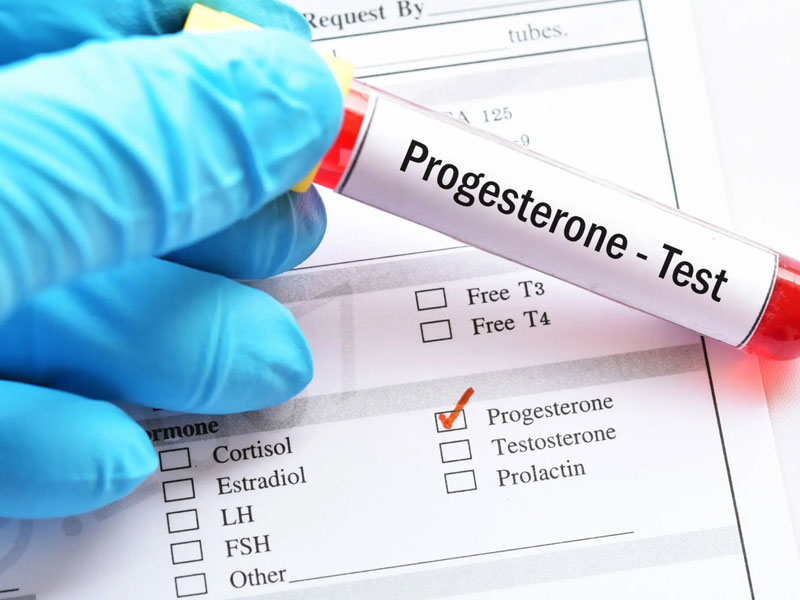
Low levels of progesterone or progesterone deficiency is a condition that affects many women. This anti-anxiety hormone helps to keep you energetic and calm before your periods. This hormone is also responsible for the endometrial buildup in the body. Adequate progesterone levels in the body are an indication of ovulation whereas low progesterone levels can lead to conditions such as extreme PMS, hot flashes, breast tenderness and even infertility. Let us take a closer look at the role progesterone plays in a woman's body, signs of progesterone deficiency, its effect on fertility and ways to overcome progesterone deficiency with Dr. Seema Sharma, Senior Consultant, Obstetrics & Gynecology, Paras Hospital, Gurugram.
Importance of Progesterone Hormone for Women

Also Read: Can A Woman Be Born With Two Uterus? Know About Uterus Didelphys From Expert
Progesterone is a hormone that is essential for carrying out the process of reproduction in both men and women. Progesterone is a very important hormone that regularizes the periods and is essential for cycle regularization. Along with this, progesterone also comes in with a protective effect. In cases where there are high levels of estrogen in a woman's body, it has the chance to get converted into cancer in the near future. If there is an unopposed estrogen present without the protective effect of progesterone, the chances of getting affected with cancer tends to increase. In case of Polycystic Ovarian Disease aka PCOD or endometriosis, there are very high levels of estrogen present. Besides this, progesterone is also very important for the continuation of pregnancy for hormonal support. Patients who have a progestron deficiency usually have a history of abortions, recurrant pregnancy loss and other such things.
Signs of Progesterone Deficiency
How to know that the progesterone levels are low? In most cases these symptoms may seem like a regular occurrence. Let us take a closer look at some of the common symptoms that work as an indicator towards the deficiency of this hormone in a woman’s body-
- Irregular periods
- Delayed periods
- Off and on spotting
- Breast tenderness
- History of recurrent pregnancy loss
- PMS
- Irritability
- Hair fall
- Hot flashes
In menopausal female when there is an absence of progestrone and only estrogen hormone is present, symptoms such as breast tenderness and hot flashes tend to occur. Due to the presence of progesterone, there is a fluid retention that takes place in the body. Absence of this hormone affects the fluid retention and hence a person might experience all these symptoms.
Relation between Progesterone Deficiency and Fertility

Also Read: Can Ultrasound Harm Your Baby Inside The Uterus? Expert Explains
Progesterone hormone plays a very important role when it comes to fertility and ovulation. Adequate levels of this hormone are necessary for regularizing your menstrual cycle. Ovulation of the body is dependent upon the menstrual cycle and hence inadequate levels of progesterone in the body affects the menstrual cycle that in turn affects a woman’s fertility. Women who suffer from progesterone deficiency or have inadequate levels of this hormone present in their body are more likely to experience recurrent pregnancy loss or have a history of abortions. A deficiency can interfere in a woman’s ability to conceive and besides this progesterone is also very important for the continuation of pregnancy for hormonal support.
Ways to overcome progesterone deficiency
Progesterone deficiency can affect a woman's body and reproductive health in many ways. Adequate levels of this hormone in the body will not just increase fertility and help you to lead a healthy life. While talking about the ways to overcome progesterone deficiency Dr. Seema Sharma suggests that - “Progesterone deficiency is not a nutritional deficiency and is caused due to hormonal imbalance. If a patient is suffering from progesterone deficiency like in the case of Polycystic Ovarian Disease, an external supplement of progesterone hormone is provided. This external supplement can either be given in the form of pills or contraceptives in order to regularize the menstruation cycle. Basically a symptomatic treatment approach is something that an expert undertakes in this situation along with treating the root cause. Regularization of periods by balancing the hormones through external medications is required to treat this deficiency and root cause of this issue.”
(With inputs from Dr. Seema Sharma, Senior Consultant, Obstetrics & Gynecology, Paras Hospital, Gurugram)







